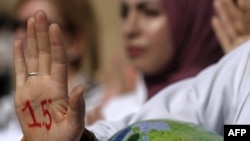The outcome of the conference in Sharm el-Sheikh is a test of world resolve to tackle global warming as other crises, ranging from Russia's war in Ukraine to consumer inflation, distract international attention.
Leaders from the G20 group of developed nations issued a declaration on Wednesday expressing support for a global goal to limit warming to 1.5 degrees Celsius, phase out coal and speed up climate finance.
But inside the negotiating rooms in Egypt, deep divisions remained, according to Egypt's COP27 presidency special representative Wael Aboulmagd.
"I think we have a larger than normal number of lingering issues," he said. "We would have hoped under the current circumstances to see more willingness to cooperate and accommodate than we are seeing."
An official close to the talks said divisions remained over issues including whether rich nations should set up a fund to cover irreparable damage being wrought by climate change, language addressing fossil fuel use and whether 1.5C should remain the explicit targeted limit for planetary warming.
"There is concern about how we're to get to the end, and there is concern because we're talking about the biggest problem facing humanity," the official said, asking not to be named.
Scientists say keeping average global temperature rise to 1.5C is needed to avert the worst effects of climate change. Temperatures have already increased by 1.1C.
Negotiations remained thorny around the issue of "loss and damage," or how to help countries hit by huge economic loss as a result of climate-driven disasters, with countries divided over whether and when to set up a fund and who should pay into it.
But on Wednesday, negotiators notched a small victory by agreeing to set up the so-called Santiago Network, a body to offer technical assistance to countries that need help rebuilding after disasters. Wealthy countries continue to resist agreeing this year to establishing a dedicated loss and damage fund.








